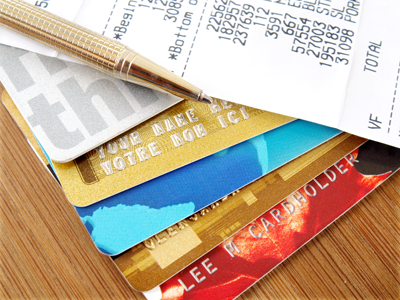Ask yourself these questions to evaluate your dependence on credit cards:
![]() Do you rely on credit cards to make it until your next paycheck?
Do you rely on credit cards to make it until your next paycheck?
![]() Does it seem you always have to put unexpected expenses on your credit card?
Does it seem you always have to put unexpected expenses on your credit card?
![]() Do you think you spend more than you would with cash because your card has rewards or discounts?
Do you think you spend more than you would with cash because your card has rewards or discounts?
![]() Do the holidays leave you with a mountain of credit card debt?
Do the holidays leave you with a mountain of credit card debt?
If you answered yes to these questions, you are probably relying too much on your credit cards. If you are concerned you are too dependent on credit cards, there are steps you can take to become credit card independent.
![]() Put your credit cards somewhere for safekeeping to reduce the temptation to use them as your regular form of payment.
Put your credit cards somewhere for safekeeping to reduce the temptation to use them as your regular form of payment.
![]() Become more disciplined with spending by enacting a cash only policy. While many people use debit cards as a convenient way to pay cash, be careful. Many financial institutions will allow you to overdraft your account when you use a debit card and may charge a large fee for this overdraft privilege.
Become more disciplined with spending by enacting a cash only policy. While many people use debit cards as a convenient way to pay cash, be careful. Many financial institutions will allow you to overdraft your account when you use a debit card and may charge a large fee for this overdraft privilege.
![]() Consolidate your balances to the cards that have the lowest interest rates and close the rest of your credit card accounts to reduce the amount of available credit and, thus, the potential amount of debt you could incur. While closing credit cards can have a negative impact on your credit score, it’s
Consolidate your balances to the cards that have the lowest interest rates and close the rest of your credit card accounts to reduce the amount of available credit and, thus, the potential amount of debt you could incur. While closing credit cards can have a negative impact on your credit score, it’s
still better to have a temporary credit score setback than to go deeper into debt if you can’t control your spending. To reduce the impact to your score, you should also consider keeping your oldest credit card in addition to a lower interest-rate card.
![]() Shock yourself into reality by looking at a few important things on your credit card statement, including: how much you are paying in interest on an annual basis, how long it will take you to pay off the balance, and how much
Shock yourself into reality by looking at a few important things on your credit card statement, including: how much you are paying in interest on an annual basis, how long it will take you to pay off the balance, and how much
you will pay in interest if you are only making the minimum monthly payment. This information can be a real eye-opener.



